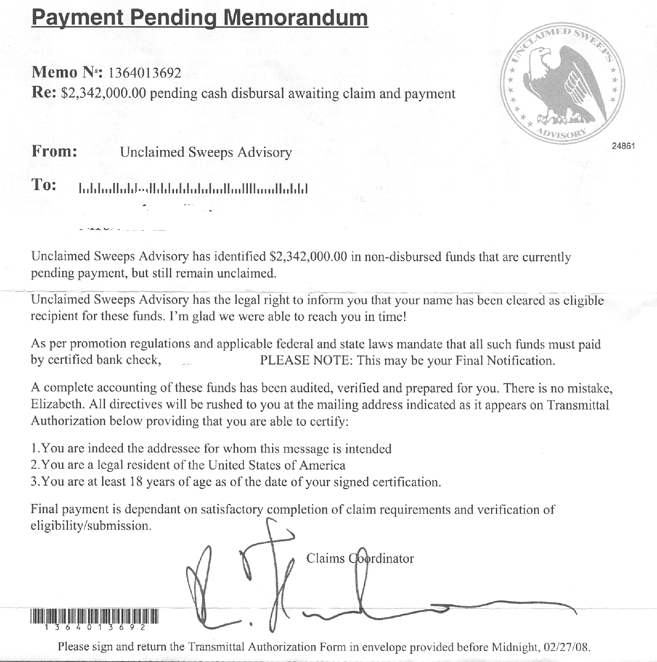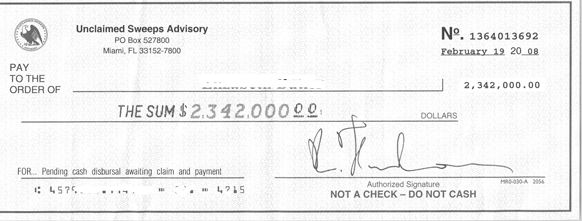There are affiliate links on this page.
Read our disclosure policy to learn more.
Sweepstakes Scams: Unclaimed Sweeps Advisory
Sweepstakes Scam Letters:
Unclaimed Sweeps Advisory
Have you received an letter with a check from "Unclaimed Sweeps Advisory" telling you that "Unclaimed Sweeps Advisory has identified $____ in non-disbursed funds that are currently pending payment, but still remain unclaimed? It is a scam.
These are fraudulent notices of large cash entitlements or awards. These notices are typically mailed from Miami, Florida and Las Vegas, Nevada, and claim the recipients will receive or are owed a large amount of money. Many of the letters also contain a check made payable to the addressee. As these checks are realistic looking forgeries drawn on real bank account numbers (stolen), attempts to cash these checks could result in criminal charges. Attempting to cash an illegitimate check, even if made out to you, and even if you cannot tell that it is a counterfeit, and even if the bank thinks it is real, can cause a legal issue, including arrest, for you.
The senders of these notices each request an enrollment, processing or registration fee (usually twenty dollars) payable to the sender. Senders names include but are not limited to:
- Allocated Disbursement Authority
- Awardable Entitlement Pooling System
- Awards Compliancy Commission
- Bureau of Cash Acquisition
- Cash Advisory Agency
- Commission of Sweepstakes Compliancy
- Continental Prize Commission
- Department of Cash Reporting
- Department of Investigative Research
- Division of Currency Claims
- Division of Monetary Resources
- Elective Prize Resource Pool
- Entry Entitlement Services
- Financial Acquisition Agency
- Monetary Entitlement Resources
- Prize Research Intelligence Agency
- Public Administrators Office
- Unclaimed Sweeps Advisory
The majority of these letters also contain a fine print legal disclaimer which can be easily overlooked by the reader. Below is an example of the scam; this letter claims to be from the "Unclaimed Sweeps Advisory".
The Federal Trade Commission has charged some of the scammers in federal court, but it appears that others have continued the scam.
According to a complaint filed by the FTC, a fraudulent sweepstakes operation has violated federal law by sending personalized mail to millions of consumers nationwide, falsely telling them that they have won a substantial cash prize, often said to be worth more than $3 million, even though no prizes were awarded.
Urging consumers to respond immediately by sending $20 in order to receive their prize, some of the mailers described an as-yet "uncollected" but "confirmed prize" in the consumer's name; some mailers represented that "unawarded money" has been "located and documented" in their name; and other mailers mentioned "Authorization to Disburse" and referred to a "guaranteed cash/prize amount" in the seven-figure range, according to the complaint.
The complaint also alleges that the mailers sometimes contained small print that vaguely referred to a "newsletter" produced by the defendants, but not expressly informing the recipients that they had not won a prize. Instead of prizes, some consumers received information about how to enter sweepstakes, and some consumers received more mailers soliciting more money and suggesting that the consumers had won other prizes.
Defendants named in the complaint, all Nevada-based, are
- National Prize Information Group Corp. (NPIGC),
- d/b/a Las Vegas Actionable Awards Program,
- Prize Search Express, Department of Unclaimed Awards,
- United States Sweepstakes Advisory,
- United States of America Patriotism Awards,
- National Bureau of Prize Information,
- Lapham Vargas and Cornell,
- Director's Office, and
- John Rincon, individually, and as an NPIGC officer.
The FTC charged them with violating Section 5 of the FTC Act, seeking a temporary restraining order, a preliminary injunction, and a freeze of their assets.
The action was brought with extensive assistance from the the Las Vegas office of the United States Postal Inspection Service and the Better Business Bureau of Southern Nevada. The Commission vote to authorize staff to file the complaint was 5-0. The complaint was filed in the U.S. District Court for the District of Nevada.
Copies of the complaint are available from the FTC's Web site and also from the FTC's Consumer Response Center, Room 130, 600 Pennsylvania Avenue, N.W., Washington, D.C. 20580.
-
Require the winner to pay - U.S. federal law prohibits sweepstakes from charging you for anything, not "delivery", couriers, taxes, fees, handling charges, or anything else!
Here is a typical scam sweepstakes winning notification.
-
More information about this scam from a town in Connecticut.
-
What to do if you think you have been the victim of a sweepstakes scam
Actual scam email (One example - the scammers constantly change names, dates and addresses!):
Keywords: Payment pending memorandum
Re: pending cash disbursal awaiting claim and payment
Note the illegible signature with no printed name.
The FTC works for the consumer to prevent fraudulent, deceptive, and unfair business practices in the marketplace and to provide information to help consumers spot, stop, and avoid them. To file a complaint in English or Spanish (bilingual counselors are available to take complaints), or to get free information on any of 150 consumer topics, call toll-free, 1-877-FTC-HELP (1-877-382-4357), or use the complaint form. The FTC enters Internet, telemarketing, identity theft, and other fraud-related complaints into Consumer Sentinel, a secure, online database available to thousands of civil and criminal law enforcement agencies in the U.S. and abroad.
References
FTC
Names of Scam / Fake / Fraud Lottery
Click here for the huge list of the names of the currently identified lottery scams companies
***

